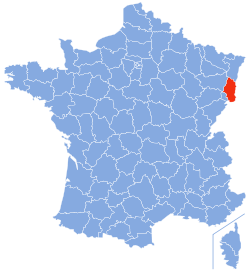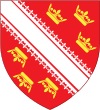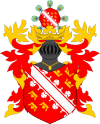Haut-Rhin
You can help expand this article with text translated from the corresponding article in French. (November 2009) Click [show] for important translation instructions.
|
Haut-Rhin
's Owerlànd, Owerelsàss | |
|---|---|
 Prefecture building of the Haut-Rhin department, in Colmar | |
 Location of Haut-Rhin in France | |
| Coordinates: 47°57′51″N 7°19′11″E / 47.96417°N 7.31972°E | |
| Country | France |
| Region | Grand Est |
| Prefecture | Colmar |
| Subprefectures | Altkirch Mulhouse Thann |
| Government | |
| • Prefect | Louis Laugier[1] |
| Area | |
| • Total | 3,525 km2 (1,361 sq mi) |
| Population (2021)[2] | |
| • Total | 767,083 |
| • Rank | 29th |
| • Density | 220/km2 (560/sq mi) |
| Time zone | UTC+1 (CET) |
| • Summer (DST) | UTC+2 (CEST) |
| Department number | 68 |
| Arrondissements | 4 |
| Cantons | 17 |
| Communes | 366 |
| ^1 French Land Register data, which exclude estuaries, and lakes, ponds, and glaciers larger than 1 km2 | |
| Part of a series on |
| Alsace |
|---|
|
|
Haut-Rhin (French pronunciation: [oʁɛ̃])[3] is a département in the Grand Est region, France, bordering both Germany and Switzerland. It is named after the river Rhine. Its name means Upper Rhine. Haut-Rhin is the smaller and less populated of the two departments of the former administrative Alsace region, the other being the Bas-Rhin (Lower Rhine). Especially after the 1871 cession of the southern territory known since 1922 as Territoire de Belfort, although it is still rather densely populated compared to the rest of metropolitan France. It had a population of 767,083 in 2021.[4]
On 1 January 2021, the départemental collectivities of Bas-Rhin and Haut-Rhin were merged into the European Collectivity of Alsace.
History
[edit]Haut-Rhin is one of the original 83 départements, created during the French Revolution, on 4 March 1790 through the application of the law of 22 December 1789 in respect of the southern half of the province of Alsace (Haute-Alsace).
Its boundaries have been modified many times:
- 1798, it absorbed Mulhouse, formerly a free city, and the last Swiss enclave in the south of Alsace;
- 1800, it absorbed the whole département of Mont-Terrible;
- 1814, it lost the territories which had been part of Mont-Terrible, which were returned to Switzerland, except for the former County of Montbéliard;
- 1816, it lost Montbéliard, which was transferred to the département of Doubs;
- 1871, it was mostly annexed by the German Empire (Treaty of Frankfurt); the remaining French part formed the Territoire de Belfort in 1922;
- 1919, it was reverted to France (Treaty of Versailles) but remains administratively separated from Belfort.
- 1940, it was annexed de facto by Nazi Germany.
- 1944, it was recovered by France.
Geography
[edit]Haut-Rhin is bordered by the Territoire de Belfort and Vosges départements and the Vosges Mountains to the west, the Bas-Rhin département to the North, Switzerland to the south and its eastern border with Germany is also the Rhine. In the centre of the département lies a fertile plain. The climate is semi-continental.
Subdivisions
[edit]The department consists of the following arrondissements:
Principal towns
[edit]The most populous commune is Mulhouse; the prefecture Colmar is the second-most populous. As of 2021, there are 11 communes with more than 10,000 inhabitants:[4]
| Commune | Population (2021) |
|---|---|
| Mulhouse | 106,341 |
| Colmar | 67,730 |
| Saint-Louis | 22,698 |
| Wittenheim | 15,262 |
| Illzach | 14,829 |
| Rixheim | 13,795 |
| Kingersheim | 13,178 |
| Riedisheim | 12,163 |
| Cernay | 11,745 |
| Guebwiller | 11,137 |
| Wittelsheim | 10,334 |
Demographics
[edit]Population development betwene 1801 and 2016:
|
| ||||||||||||||||||||||||||||||||||||||||||||||||||||||||||||||||||||||||||||||||||||
| |||||||||||||||||||||||||||||||||||||||||||||||||||||||||||||||||||||||||||||||||||||
| source:[5][6] | |||||||||||||||||||||||||||||||||||||||||||||||||||||||||||||||||||||||||||||||||||||
Economy
[edit]Haut-Rhin is one of the richest French départements. Mulhouse is the home of the Stellantis Mulhouse Plant automobile factory, where the Peugeot 2008 and Peugeot 508 are currently built. The lowest unemployment rate in France can be found in the Southern Sundgau region (approximately 2%). The countryside is marked by hills. Many Haut-Rhinois work in Switzerland, especially in the chemical industries of Basel, but commute from France where living costs are lower. However, the region does have some of France's worst socio-economic inequalities; Mulhouse has long been one of France's poorest major cities.
Law
[edit]Alsace and the adjacent Moselle department have a legal system slightly different from the rest of France. The statutes in question date from the period 1871–1919 when the area was part of the German Empire. With the return of Alsace-Lorraine to France by the Treaty of Versailles in 1919, Paris accepted that Alsace and Moselle should retain some local laws in respect of certain matters, especially with regard to hunting, economic life, local government relationships, health insurance and social rights. It includes notably the absence of any formal separation between church and state: several mainstream denominations of the Christian church benefit from state funding, in contrast to principles applied in the rest of France.
Politics
[edit]Presidential elections 2nd round
[edit]| Election | Winning Candidate | Party | % | 2nd Place Candidate | Party | % | |
|---|---|---|---|---|---|---|---|
| 2022 | Emmanuel Macron | LREM | 52.90 | Marine Le Pen | FN | 47.10 | |
| 2017[7] | Emmanuel Macron | LREM | 57.97 | Marine Le Pen | FN | 42.03 | |
| 2012 | Nicolas Sarkozy | UMP | 63.33 | François Hollande | PS | 36.67 | |
| 2007 | Nicolas Sarkozy | UMP | 65.39 | Ségolène Royal | PS | 34.61 | |
| 2002[7] | Jacques Chirac | RPR | 77.65 | Jean-Marie Le Pen | FN | 22.35 | |
| 1995[8] | Jacques Chirac | RPR | 57.26 | Lionel Jospin | PS | 42.74 | |
Current National Assembly Representatives
[edit]Tourism
[edit]-
Mulhouse town hall
-
View from the Ballon d'Alsace
Culture
[edit]See also
[edit]- Cantons of the Haut-Rhin department
- Communes of the Haut-Rhin department
- Arrondissements of the Haut-Rhin department
References
[edit]- ^ Décret du 29 juillet 2020 portant nomination du préfet du Haut-Rhin, Légifrance
- ^ "Téléchargement du fichier d'ensemble des populations légales en 2021" (in French). The National Institute of Statistics and Economic Studies. 28 December 2023.
- ^ lit. 'Upper Rhine'; Alsatian: Owerelsàss or ‘s Iwerlànd;Office pour la Langue et la Culture d’Alsace. "Wàs brücht m'r im Elsàss ? Petit lexique français-alsacien" (PDF). oclalsace.org (in French). Archived (PDF) from the original on 2022-10-09. Retrieved 10 December 2013. German: Oberelsass, lit. 'Upper Alsace'
- ^ a b "Populations légales en vigueur à compter du 1er janvier 2024: 68 Haut-Rhin" (PDF). INSEE. Retrieved 16 January 2024.
- ^ "Historique du Haut-Rhin". Le SPLAF.
- ^ "Évolution et structure de la population en 2016". INSEE.
- ^ a b "Présidentielles".
- ^ "Résultats de l'élection présidentielle de 1995 par département - Politiquemania".
- ^ Nationale, Assemblée. "Assemblée nationale ~ Les députés, le vote de la loi, le Parlement français". Assemblée nationale.
External links
[edit]- (in French) Prefecture website
- (in French) Collectivité européenne d'Alsace
- (in English) Haut-Rhin at Curlie









